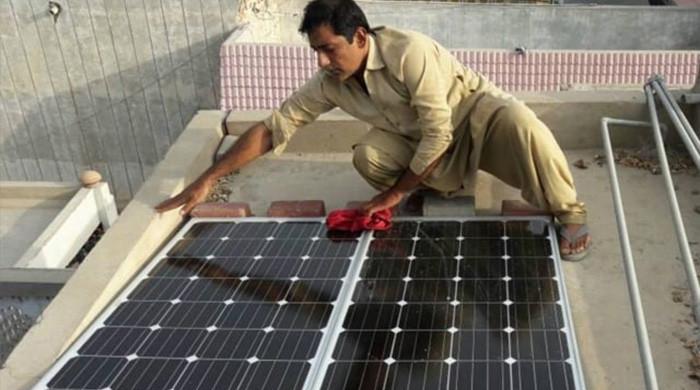ISLAMABAD: The federal government has planned to introduce a “gross metering” policy to replace already in place “solar net metering” which could curtail monetary benefits of the rooftop solar panel owners, sources told Geo News.
The Pakistan Muslim League-Nawaz (PML-N)-led government started working on envisaging the gross metering policy for rooftop solar panels which would extensively reduce financial benefits of the in-house power generation, as per the insiders.
The sources said that recommendations have been tabled to end unit-for-unit formula under the gross metering, whereas, the prices of electricity units given to the national grid would be halved under the new policy.
It was also learnt that the government will purchase electricity units from the rooftop solar panel owners at the price set by the Central Power Purchasing Agency (CPPA). On the other hand, the power distribution companies (Discos) will sell the electricity to the consumers at the government rates.
The sources added that Pakistan also held talks with the International Monetary Fund (IMF) regarding its gross metering policy. The new policy is likely to be presented before the federal government and Council of Common Interests (CCI) for its final approval.
Emphasising to reduce losses in the in power sector, Federal Minister for Energy Sardar Awais Ahmad Leghari also hinted at a plan to revise the country’s solar net metering policy.
“We are facing an issue of solar net metering these days,” Leghari said while addressing a press conference alongside Minister of State for Finance, Revenue and Power Ali Pervaiz Malik on Sunday.
The PML-N-led government had encouraged solarisation in 2017 and currently, 113,000 connections were present on net meters, he added.
Leghari clarified that the PML-N government was in favour of continuing solar net metering, encouraging renewable energy, as well as taking effective steps to eliminate the menace of power theft to reduce the financial burden on the national exchequer.
He further detailed that the government was studying and assessing the impacts of an increasing trend of rooftop-generated electricity. The minister said that it would be assessed to ascertain the rate of return after making investments in solar equipment.
He added that they would also study if the increasing reliance on solar panels was impacting the local households in terms of inflated electricity prices. Like Australia and other countries, Pakistan will also be involved in analysing and balancing the solar net metering, said the minister.
He advocated for the continuation of the solar metering policy, however, he clarified that the power authorities will review it if needed. He added that there was an 8% reduction in electricity demand.
Leghari said that the power demand was 19,000MW yesterday while Discos generated over 16,500MW besides carrying out over 4,000MW of “economic loadshedding” on the feeders where they bore 70 to 90% losses.
Elaborating on the strategy to reduce losses in the power sector, the energy minister vowed to further intensify the anti-power theft drive across the country.
To a question, he replied that the power authorities had already recognised billing issues in many Discos and new boards will be formed to let them run the power firms independently without engaging the concerned ministries.
He added that the country would be able to come out of power crisis after completing different hydroelectricity power generation projects in the next six to seven years.

